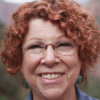Margaret J. Wheatley

Margaret J. Wheatley
Margaret J. Wheatleyis an American writer and management consultant who studies organizational behavior. Her approach includes systems thinking, theories of change, chaos theory, leadership and the learning organization: particularly its capacity to self-organize. Her work is often compared to that of Donella Meadows and Dee Hock. She describes her work as opposing "highly controlled mechanistic systems that only create robotic behaviors."...
NationalityAmerican
ProfessionWriter
CountryUnited States of America
Margaret J. Wheatley quotes about
meaningful world connections
When we seek for connection, we restore the world to wholeness. Our seemingly separate lives become meaningful as we discover how truly necessary we are to each other.
reflection creating way
Without reflection, we go blindly on our way, creating more unintended consequences, and failing to achieve anything useful.
people care conversation
Very great change starts from very small conversations, held among people who care.
community isolation individual
Relationships are all there is. Everything in the universe only exists because it is in relationship to everything else. Nothing exists in isolation. We have to stop pretending we are individuals that can go it alone
community care discovering
There is no power for change greater than a community discovering what it cares about.
leadership motivation differences
It's not differences that divide us. It's our judgments about each other that do.
creating our-world self
We each create our world by what we choose to notice, creating a world of distinction that makes sense to us. We then 'see' the world through the self we have created.
people listening benefits
There are many benefits to this process of listening. The first is that good listeners are created as people feel listened to. Listening is a reciprocal process - we become more attentive to others if they have attended to us.
ideas people soul
Life now insists that we encounter groundlessness. Systems and ideas that seemed reliable and solid dissolve at an increasing rate. People who asked for our trust betray or abandon us. Strategies that worked suddenly don't. Groundlessness is a frightening place, at least at first, but as the old culture turns to mush, we would feel stronger if we stopped searching for ground, if we sought only to locate ourselves in the present and do our work from here.
order play giving
Disorder can play a critical role in giving birth to new, higher forms of order.
world poet possibility
We are, always, poets, exploring possibilities of meaning in a world which is also all the time exploring possibilities.
knowledge learning diversity
A leader these days needs to be a host - one who convenes diversity; who convenes all viewpoints in creative processes where our mutual intelligence can come forth.
courage determination risk
Determination, energy, and courage appear spontaneously when we care deeply about something. We take risks that are unimaginable in any other context.
leadership hero roles
Leadership is a series of behaviors rather than a role for heroes.